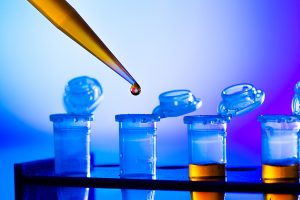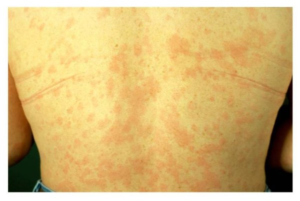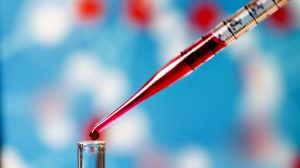Schnitzler Syndrome Specimens
Bay Biosciences provides high quality, clinical grade bio-samples, cryogenically preserved biopsy tissue, FFPE blocks, sera (serum), plasma and peripheral blood mononuclear cells (PBMC) biofluid specimens from patients diagnosed with Schnitzler Syndrome.
The sera (serum), plasma and PBMC biofluid samples are processed from patient’s peripheral whole-blood using customized processing protocols. The Schnitzler Syndrome bio-specimens are collected from unique patients diagnosed with Schnitzler Syndrome and are provided to a valued pharmaceutical customer for translational research, genomics, proteomics and biomarker research, drug discovery and development.

Schnitzler Syndrome Overview
Schnitzler Syndrome also known as Chronic Urticaria is a rare autoinflammatory disease characterized by onset around middle age of chronic hives (Urticaria) and periodic Fever, arthritis (bone pain and joint pain), sometimes with joint inflammation, weight loss, malaise, fatigue, swollen lymph glands, hematological abnormalities, organomegaly (abnormally enlarged organs), enlarged spleen and liver. The exact underlying cause of the condition is unknown; however, most cases occur sporadically in patients with no family history of the condition. Treatment is focused on alleviating the signs and symptoms associated with the condition and may include various medications and/or phototherapy.
Schnitzler Syndrome is considered an autoinflammatory disorder and is generally treated with anakinra, which inhibits interleukin-1. This treatment controls the condition but does not cure it. Some of the patients develop complications, but the condition generally does not shorten life. Conventional therapies including anti-histamines for the skin rash, as well as anti-inflammatory drugs, steroids and immunosuppressive drugs for the systemic signs, are usually ineffective. However, the IL-1 receptor antagonist anakinra was found to rapidly control all the symptoms of this syndrome, but signs recur as soon as the treatment is stopped.

Schnitzler Syndrome Causes
The cause of Schnitzler Syndrome is unknown. Alterations in the cytokine network have been reported. Interleukin-1 alpha binding activity has been described in some patients with Schnitzler Syndrome. Interleukin-1 alpha is a cytokine or inflammatory mediator and could explain some of the inflammatory symptoms of the syndrome. Some of the Schnitzler Syndrome patients have been described with a mutation in the gene NLRP3. Patients with Schnitzler syndrome may present to dermatologists, hematologists, rheumatologists and general physicians because of the variety of possible symptoms. The diagnosis is often delayed because of multiple complications.
Schnitzler Syndrome Symptoms
The signs and symptoms related to the Schnitzler Syndrome may include:
- Recurrent Hives, mostly on the torso and limbs
- Typical Onset is at around 55 years old
- Recurring Fever
- Joint Pain
- Bone Pain
- Muscle Pain
- Headache
- Fatigue
- Weight Loss
Schnitzler Syndrome Clinical Features
Urticaria
Urticaria (hives) describes red raised patches of skin. These are rarely itchy in Schnitzler syndrome, unlike ordinary urticaria. Weals may last longer than ordinary urticaria, often persisting for 12 hours to 3 days. A skin biopsy may or may not show features of urticarial vasculitis, it may show a neutrophil-rich infiltrate. Angioedema (deep swelling) may also occur in some patients.
Arthritis/ Arthralgia
Painful joints (arthralgia) or swollen joints (arthritis) occur in majority of the Schnitzler Syndrome patients, some patients experience bone pain.
Fever
Intermittent Fever up to 40C affects most of patients with Schnitzler Syndrome, the fever may be accompanied by chills and night sweating.
Organomegaly
Organomegaly refers to enlarged internal organs, i.e., large lymph nodes (lymphadenopathy) in most of the Schnitzler Syndrome patients, and enlarged liver and spleen (hepato-splenomagaly) in some of the patients.
Hematological Abnormalities
The main hematological (blood) abnormality of Schnitzler Syndrome is monoclonal gammopathy. This usually means a raised level of immunoglobulin M (IgM) but raised immunoglobulin G (IgG) or combinations of IgM and IgA or IgM and IgG have also been reported. Bone marrow tests are normal in majority of the patients at the time of Schnitzler Syndrome diagnosis.
Other Hematological Abnormalities in Schnitzler Syndrome may include:
- Elevated C-reactive protein (CRP) or erythrocyte sedimentation rate (ESR)
- Lowered complement levels (C4)
- Anemia of chronic disease
- Thrombocytosis (raised platelet count)
- Neutrophilic Leucocytosis (raised neutrophil white blood cells)
Schnitzler Syndrome Prognosis
Schnitzler syndrome is a chronic condition, and it has not been reported to resolve. Although symptoms can be a nuisance, the condition does not lead to a serious disease in the majority of patients. However some of the patients progress to a lymphoproliferative disorder such as Waldenström macroglobulinemia or B-cell lymphoma. In Schnitzler’s original case the patient died aged 88 years with diffuse “lymphoplasmacytic malignancy” after 20 years of follow up.

Detailed clinical data, computerized tomography CT, MRI, PET scans info, anti-GBM antibodies, HLA test, elevated biomarker levels, genetic and metabolic information, lung tumor tissue biopsy, pathology annotations associated with the Schnitzler Syndrome patient’s specimens is provided to a valued customer for research, development and discovery. The Schnitzler Syndrome sera (serum), plasma and PBMC biofluid samples are processed from patients peripheral whole-blood using customized collection and processing protocols provided by the researcher.
Bay Biosciences is a global leader in providing researchers with high quality, clinical grade, fully characterized human tissue samples, bio-specimens and human bio-fluid collections from cancer (tumor) tissue, cancer sera (serum), cancer plasma, cancer PBMC and human tissue samples from most other therapeutic areas and diseases.
Bay Biosciences maintains and manages it’s own bio-repository, human tissue bank (biobank) consisting of thousands of diseased samples (specimens) and from normal healthy donors available in all formats and types. Our biobank procures and stores fully consented, deidentified and institutional review boards (IRB) approved human tissue samples and matched controls.
All our human human tissue collections, human specimens and human bio-fluids are provided with detailed samples associated patient’s clinical data. This critical patient’s clinical data includes information relating to their past and current disease, treatment history, lifestyle choices, biomarkers and genetic information. Patient’s data is extremely valuable for researchers and is used to help identify new effective treatments (drug discovery & development) in oncology, other therapeutic areas and diseases. This clinical information is critical to demonstrate their impact, monitor the safety of medicines, testing & diagnostics, and generate new knowledge about the causes of disease and illness.
Bay Biosciences banks wide variety of human tissue samples and biological samples including cryogenically preserved -80°C, fresh, fresh frozen tissue samples, tumor tissue samples, FFPE’s, tissue slides, with matching human bio-fluids, whole blood and blood derived products such as serum, plasma and PBMC’s.
Bay Biosciences is a global leader in collecting and providing human tissue samples according to the researchers specified requirements and customized, tailor made collection protocols. Please contact us anytime to discuss your special research projects and customized human tissue sample requirements.
Bay Biosciences provides human tissue samples (human specimens) from diseased and normal healthy donors; including peripheral whole-blood, amniotic fluid, bronchoalveolar lavage fluid (BAL), sputum, pleural effusion, cerebrospinal fluid (CSF), serum (sera), plasma, peripheral blood mononuclear cells (PBMC’s), saliva, Buffy coat, urine, stool samples, aqueous humor, vitreous humor, kidney stones, renal calculi, nephrolithiasis, urolithiasis and other bodily fluids from most diseases including cancer. We can also procure most human bio-specimens and can do special collections and requests of human samples that are difficult to find. All our human tissue samples are procured through IRB approved clinical protocols and procedures.
In addition to the standard processing protocols Bay Biosciences can also provide human plasma, serum, PBMC bio-fluid samples using custom processing protocols, you can buy donor specific sample collections in higher volumes and specified sample aliquoting from us.
Bay Biosciences also provides human samples from normal healthy donors, volunteers, for controls and clinical research, contact us Now.
日本のお客様は、ベイバイオサイエンスジャパンBay Biosciences Japan またはhttp://baybiosciences-jp.com/contact/までご連絡ください。


